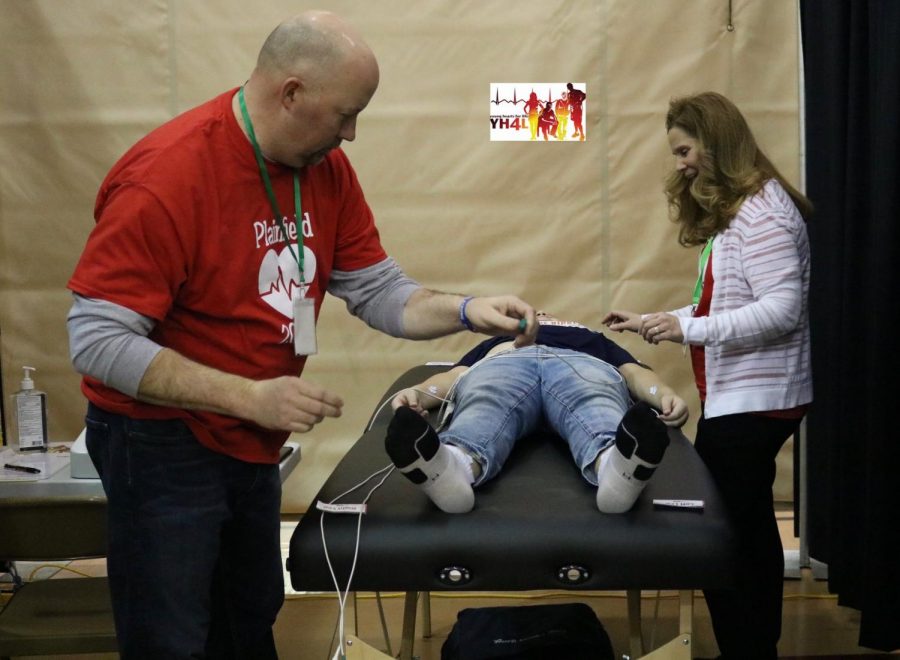Volunteers screen 1,401 young hearts
February 7, 2019
On Jan. 17, Young Hearts For Life Cardiac Screening Program offered free electrocardiogram screenings at North for all students.
1,401 students registered for the screenings that took place during the school day in the fieldhouse.
“They set up on Wednesday after school, and I did a training at night with the volunteers and taught them how to hook up the equipment and the leads on the kids,” Principal Ross Draper said.
Students were encouraged to register because the ECG screening can detect any heart diseases that cannot be detected at a doctor’s office.
“Students should register for this ECG screening because many times if there an underlying or undetected heart condition that is not detected in a routine physical exam done by a health care provider,” health division chair Lynette Bayer said. “This screening is at no cost to the family and could potentially prevent [someone] from suffering from sudden cardiac arrest.”
Students also registered for it because it could potentially help save a person’s life.
“I think students should register for it so that they don’t randomly die one day, like a BBC video I saw,” senior Kate Fuez said.
The heart screening was free for students. Normally, the test would cost $75-$100, but YH4L has sponsors to cover the cost of equipment.
“It’s free because the organization works with the district and sponsors to pay for costs that they need to cover their equipment as far as rentals for tables, those types of things,” Draper said. “It just depends on how much money has been donated or raised.”
Organizations like Edward-Elmhurst Health and The Mark Crabtree YH4L Memorial Fund, sponsored the heart screening.
After students were screened, they got their results on the same day if there was something unusual on their reading.
“If there is a concern on one of the readings from the ECG machine, there is contact home before the student leaves for the school day,” Assistant Principal Darnell Weathersby said. “All of the results from the screening are read by a cardiologist.”
All other parents will get their child’s results by an email sent to them with a link.
“They will need their student’s school ID number and the RA number they received at registration to retrieve those results,” Weathersby said. “This email is sent out once all the data has been entered and takes 2-3 weeks usually.”
According to the YH4L website, a simple ECG, when used to screen young adults can detect certain serious heart conditions. Recording the electrical activity of the heart using electrodes attached to the skin with a mild adhesive, can detect approximately 60% of the abnormalities or “markers” from these heart conditions that are associated with sudden cardiac death that a stethoscope cannot.
“It’s basically where they hook leads up to your chest, and it records the rhythm of your heart,” Draper said.
ECG screenings result in less than 2% of the tests being falsely positive.
This may require additional evaluation and testing by a physician. YH4L believes that the benefit of this potentially lifesaving screening outweighs this concern.
The cardiac screening program is intended to increase the public’s awareness of this issue.
According to the YH4L website, “a student’s privacy and confidentiality will be respected throughout all aspects of the program. Only female technicians will test girls, and they will be screened in a separate area from boys.
The results of students screening will not be shared with the school, only with their families.
According to the YH4L website, sports physicals can only detect four percent of students at risk for sudden cardiac death. ECG machines can detect 70 percent of students at risk for SCD.
“I think it’s a good opportunity for kids and parents to have this for them at school, for free, to hopefully both educate and measure their cardiac health,” Draper said. “If there’s an issue, it provides them an opportunity to get help if needed.”
The Young Hearts For Life organization was started for parents and siblings who have lost a family member. They have performed these screenings on over 180,000 students.







